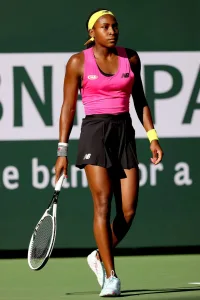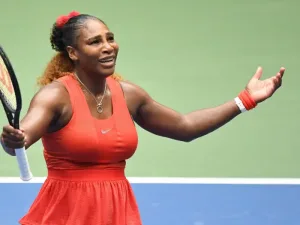Coco Gauff is starting to worry: Serena Williams’ ex-coach doesn’t hold back on criticism

Coco Gauff has been a rising star in the world of tennis since she burst onto the scene as a teenager. With incredible talent and a strong work ethic, she has been seen as the future of American women’s tennis. However, like any young athlete, Gauff has faced both praise and criticism, and recent remarks from Serena Williams’ former coach have sparked fresh debate about her progress and performance.
Gauff’s early career has been marked by significant achievements. She gained international attention when she defeated Venus Williams at Wimbledon in 2019 as a 15-year-old. Since then, she has continued to climb the rankings, capturing major titles, including the 2023 US Open, which solidified her status as a top contender in the sport. Her combination of athleticism, mental toughness, and composure under pressure has made her a favorite among fans and analysts alike. But despite her success, some experts believe she has areas that need significant improvement if she is to dominate the sport as Serena Williams once did.
Serena Williams’ ex-coach, Patrick Mouratoglou, has been vocal about his assessment of Gauff’s game, and his recent criticism has generated discussion among tennis enthusiasts. Mouratoglou, known for his role in shaping Serena’s legendary career, did not hold back in pointing out what he believes are weaknesses in Gauff’s game. His main concerns center around her forehand, decision-making on the court, and consistency against top-ranked opponents.
One of the biggest critiques of Gauff’s game has always been her forehand. While her backhand is widely regarded as one of the best in women’s tennis, her forehand has been considered inconsistent and, at times, a liability. Mouratoglou echoed this sentiment, stating that unless she improves this stroke, she will struggle against the best players in the world. Many analysts have noted that her forehand lacks the fluidity and natural power of her backhand, making her vulnerable against aggressive opponents who target that side.
In addition to technical concerns, Mouratoglou also questioned Gauff’s tactical approach. He suggested that while she possesses tremendous athletic ability, her shot selection and strategic execution need refinement. Some critics argue that Gauff often plays too defensively, relying on her speed and defensive skills rather than taking control of points. Tennis today demands a more aggressive style, especially for players aiming to win multiple Grand Slam titles. If Gauff does not adapt, she may struggle to consistently beat the likes of Iga Świątek, Aryna Sabalenka, and other top-tier players who impose their game on opponents.
Another issue Mouratoglou highlighted was Gauff’s performance under pressure. While she has shown remarkable composure in tough matches, there have been moments where her decision-making has faltered. In key situations, she has been prone to unforced errors, particularly when opponents put her under sustained pressure. This inconsistency has cost her matches against elite players who exploit any sign of weakness.
However, it is important to note that Gauff is still incredibly young. At just 20 years old, she has already achieved more than many players do in their entire careers. Mouratoglou’s criticism should not be seen as an outright dismissal of her potential but rather as a call to action for her to refine her game and reach the next level.
Supporters of Gauff argue that criticism at this stage in her career is premature. Many tennis greats, including Serena Williams, faced similar scrutiny early in their careers but managed to develop into dominant champions. Gauff’s work ethic, mental strength, and ability to learn from losses indicate that she has the capacity to improve and address the weaknesses in her game.
Furthermore, Gauff’s recent achievements prove that she is already an elite player. Her US Open victory was a testament to her resilience and ability to perform on the biggest stage. She has consistently been a threat in major tournaments and continues to refine her game with the help of her coaching team.
One aspect that has set Gauff apart from her peers is her maturity both on and off the court. She has been vocal about social issues, using her platform to speak on matters beyond tennis. Her leadership and confidence in addressing important topics have earned her respect worldwide, further cementing her status as a role model for young athletes.
Looking ahead, Gauff’s response to this criticism will be crucial. Many players use criticism as motivation, and if she can channel this into refining her game, she has the potential to dominate women’s tennis for years to come. The tennis world has seen how players evolve over time, and Gauff’s journey is far from over. Her ability to absorb feedback, work on her weaknesses, and continue growing will determine how far she goes in her career.
Ultimately, while Mouratoglou’s comments may seem harsh, they come from a place of experience. Having coached one of the greatest players of all time, he understands what it takes to succeed at the highest level. If Gauff can take these critiques constructively, she may turn them into strengths and further establish herself as one of the best players in the world.
The journey of an elite athlete is rarely smooth, and Gauff is no exception. With the right mindset and continued hard work, she has the potential to silence her critics and add to her growing list of achievements. The world will be watching as she takes the next steps in her career, and if history is any indication, she is far from done making her mark on the sport.







